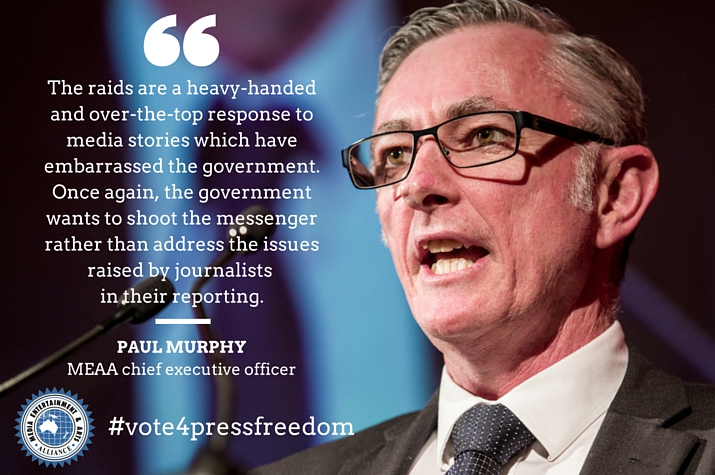AFP raids put the spotlight back on press freedom

In the second week of the federal election campaign, press freedom is in the spotlight following Australian Federal Police raids in pursuit of a whistleblower who was the source of sensitive documents leaked to the media.
The offices and home of a Labor staffer in Melbourne were searched last Thursday (May 19) night as AFP officers executed warrants as part of an investigation into the source of leaks about the National Broadband Network which have been published in recent months.
MEAA chief executive officer Paul Murphy says the raids are a disturbing new twist in pursuit of whistleblowers and legitimate public interest journalism.
“The raids are a heavy-handed and over-the-top response to media stories which have embarrassed the government,” Mr Murphy says.
“Once again, the government wants to shoot the messenger rather than address the issues raised by journalists in their reporting.”
Following the publication of the stories, The Sydney Morning Herald, The Australian Financial Review, The Australian, the ABC and the Delimiter website were all named in search warrants.
The AFP has asserted it has acted lawfully in executing the warrants and that there has been no government interference in the timing of the raids during the election campaign.
But Mr Murphy says the problem lay with the law itself when police search warrants can be used to pursue legitimate whistleblowers.
“Both major parties have voted to bring into force legislation which has complete disregard for the public interest and instead targets whistleblowers and journalists.
“As Edward Snowden recently commented, specifically about the situation in Australia, ‘Sometimes the scandal is what the law allows’.”
Mr Murphy says the AFP also needs to be open about whether journalists’ metadata has been accessed without their knowledge.
“The access of journalists’ phone and internet records potentially puts them inadvertently in breach of the journalists’ code of ethics and the obligation to protect confidential sources,” Mr Murphy said.
“The answers given by [AFP] Commissioner Colvin to these questions were completely unsatisfactory.
“We were told that it was necessary to pass the metadata retention laws for national security purposes, but I am sure most Australians would be appalled to learn that the metadata laws are being used in this way.”
MEAA’s #vote4pressfreedom campaign seeks to remind people of the importance of press freedom in a healthy functioning democracy, and put a spotlight on recent changes that are constraining press freedom in Australia.
These changes include the metadata retention laws, which allow government agencies to secretly pursue journalists’ confidential sources, such as whistleblowers; and Section 35P of the ASIO Act, which has jail terms of up to 10 years for legitimate public interest reporting on ASIO special intelligence operations.
The most recent laws passed the Parliament with bipartisan support. Nothing will change unless journalists and the supporters of press freedom raise the volume.
“Australia was once a bastion of press freedom and freedom of expression but now governments are pursuing journalists and their sources, criminalising legitimate journalism in the public interest and denying the public’s right to know with pressure mounting to further deny information from becoming public,” Mr Murphy says.
“There is a great deal of effort being expended by government to avoid legitimate scrutiny. And it’s getting worse. These attacks on press freedom undermine democracy.”